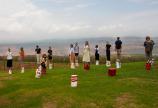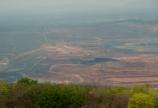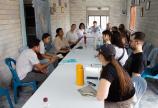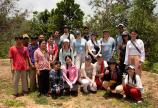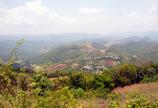Thailand field school a transformative experience
- Katie Dey and Anne MacLaurin
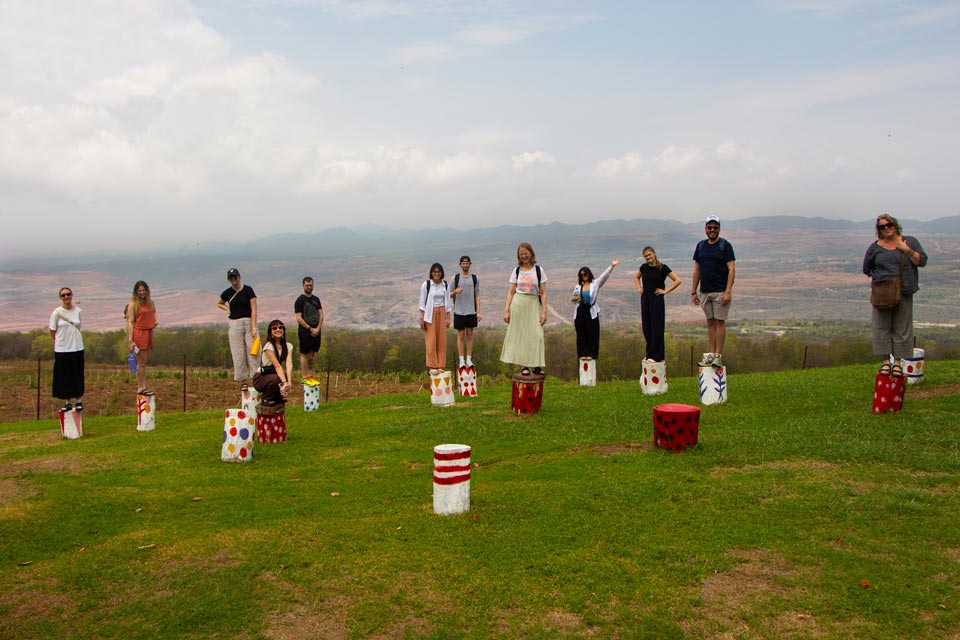
In May, 10 UVic students embarked on a two-and-a-half-week field school in Thailand where they learned about issues of development, environment and community resilience.
Funded through the Government of Canada’s new Global Skills Opportunity pilot program, priority was given to students typically underrepresented in overseas opportunities: low-income students, students with disabilities and Indigenous students.
The field school offered an inclusive environment to express our differences and learn from one another as a diverse group of students.”
—Fourth year Public Health and Global Development student Sarah Pollard
The students met with community leaders and activists, visited a large coal-mining operation, and attended presentations and events hosted by Chiang Mai University (CMU). They also spent time with an NGO whose mission is to defend human rights and the environment.
Global Development Studies instructor and CAPI’s internship program manager Robyn Fila, in collaboration with long standing Thai community partners, developed the in-country component of the field school. With years of experience placing students in long-term internships across the Asia-Pacific, Fila was able to create a unique and diverse learning experience for the students.
“Providing students the opportunity to be out in the world, learning with the world and from communities who are experiencing first-hand the effects of what they study in theory is invaluable… the connections drawn, and deeply reflective nature of this type of learning, is an integral step in developing confidence, resilience and the skills and knowledge needed to be more globally engaged citizens,” says Fila.
Political science associate professor Will Greaves joined Fila as the field school’s co-instructor.
“Field schools serve two key purposes: they give students an opportunity to bring their classroom learning into the broader world, and to experience opportunities to learn in new, exciting and sometimes uncomfortable ways. Field schools help bridge academic and experiential learning environments, engage students with various learning styles, and demonstrate first-hand many of the complexities and challenges of conducting social science research,” says Greaves.
The students were also accompanied by two Thai nationals: UVic law PhD candidate and CMU law faculty Songkrant ‘Kan’ Pongboonjun, as well as legal researcher Witchalawalee ‘Dream’ Kumboonreung, who joined the group in her home city of Chiang Mai. Kan and Dream acted as teachers, translators, cultural liaisons and all-round ‘fixers.’ Their insights, wisdom and community connections were invaluable.
“Kan and Dream were essential to my learning in the course. I feel so much gratitude towards the education and open dialogue I had with them both,” says Pollard.
Once in Thailand, the students bonded quickly as a group, were supportive of one another, and were very excited to be experiencing a new part of the world. They were always engaged, whether they were discussing the learning outcomes of a community visit, exploring a temple or visiting the local 7-11 to discover some new Thai-style snacks. It was clear that the group dynamic and relationships that the students formed with one another were an integral part of their experience.
“The inclusiveness of the whole group enriched the learning process, especially given how student perspectives were highlighted,” says Esther Chan, fourth year political science student.
The students met activists and leaders, including Maliwan Nakviroj, who became an advocate for the health of her village after many of the residents suffered respiratory problems due to the proximity of the large Mae Moh lignite coal mine and power plant. The students visited the Mae Moh site, and later the village of Kaboedin in the lush, forested hills of Omkoi where another coal mine has been proposed. Here, the students talked with the youth who have mobilized their community to protest against the development.
The field school trip was an amazing experiential learning opportunity that helped bridge a gap between my classroom learning and the lived experiences of people and communities in Northern Thailand.”
—Esther Chan, fourth year UVic political science student
The students faced many challenges, including heat and humidity, travelling for long distances on long and nauseatingly twisty roads, or being pushed outside their food comfort zone. A night spent in a more rustic setting proved challenging: there were ants discovered in a bed, a snake in the bushes and a large tokay gecko croaking in a bathroom.
The students—who were sharing rooms—had very little time to themselves, and after a week, several of them admitted they had “depleted their social batteries.” They were wholly reliant on Kan and Dream for translation, and community visits were sometimes in challenging conditions, with heat, noise and, on one occasion, thick smoke from an outdoor kitchen. Learning in these environments served to highlight the contrast between attending lectures in a comfortable UVic classroom and participating in such an immersive experience. Despite any challenges, the students remained positive and engaged throughout the field school.
“It was a transformative, challenging and rewarding experience for absolutely everyone involved, which in my opinion means it was a great class and is a sign it accomplished what it needed to—that’s what school is all about,” says Mackenzie Duggan, a fourth year political science student.
The Thailand field school will be offered again in 2024. Visit the CAPI website for more information.

